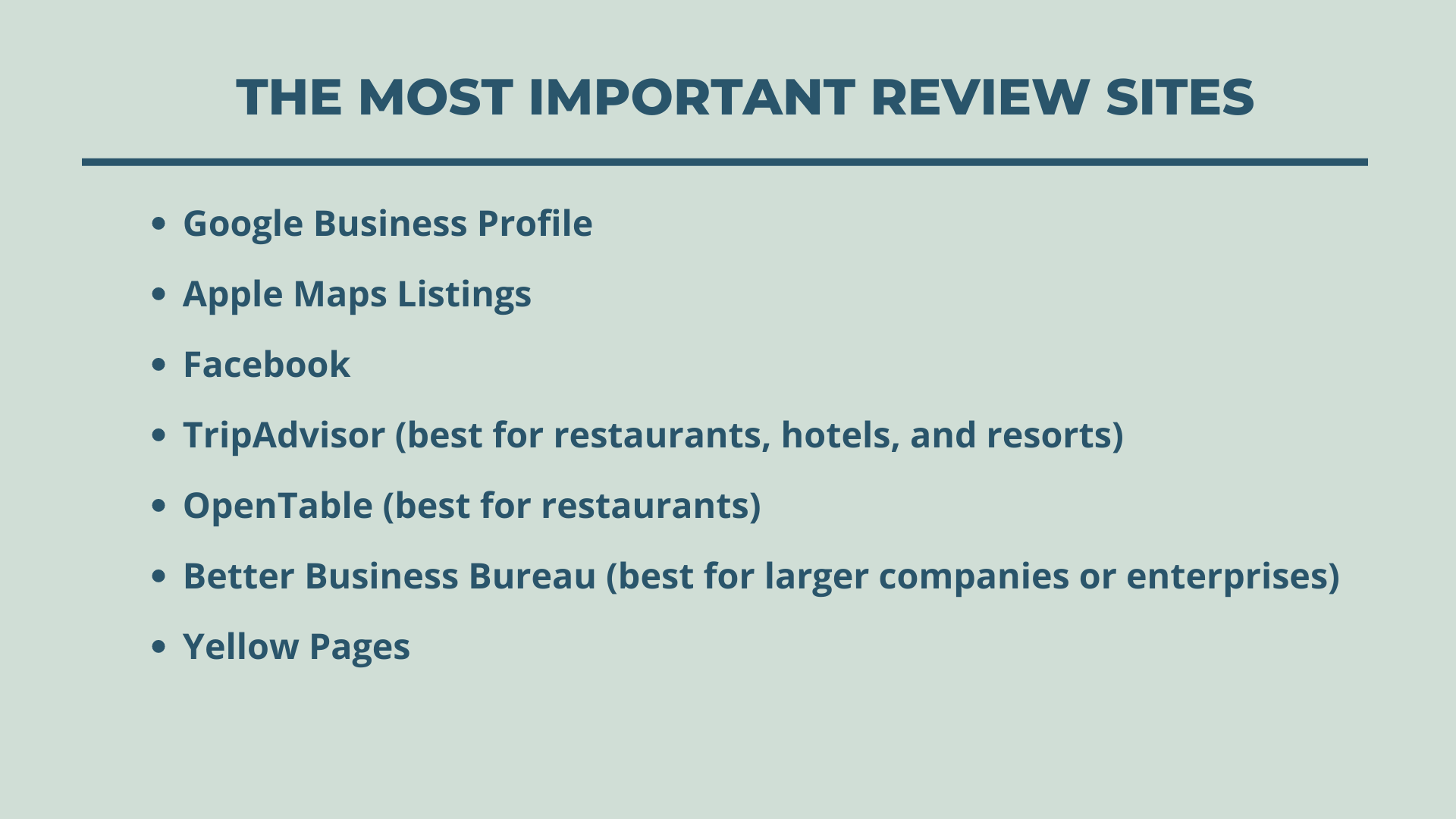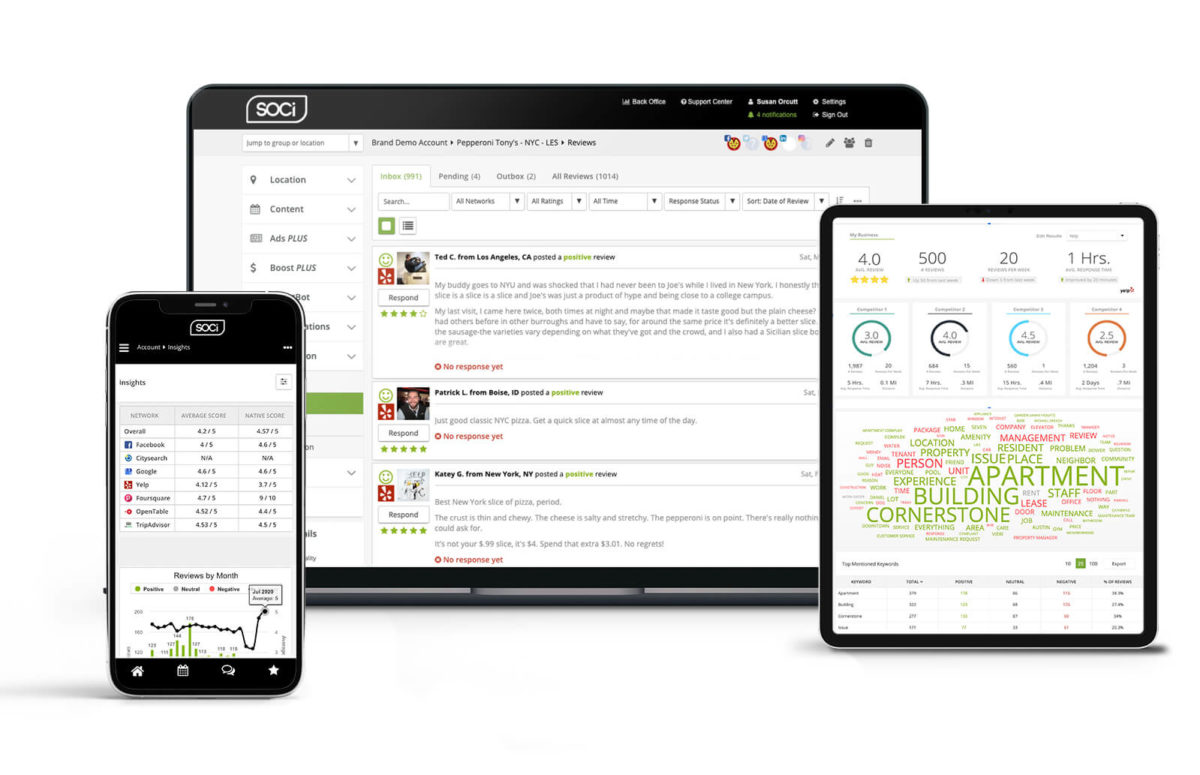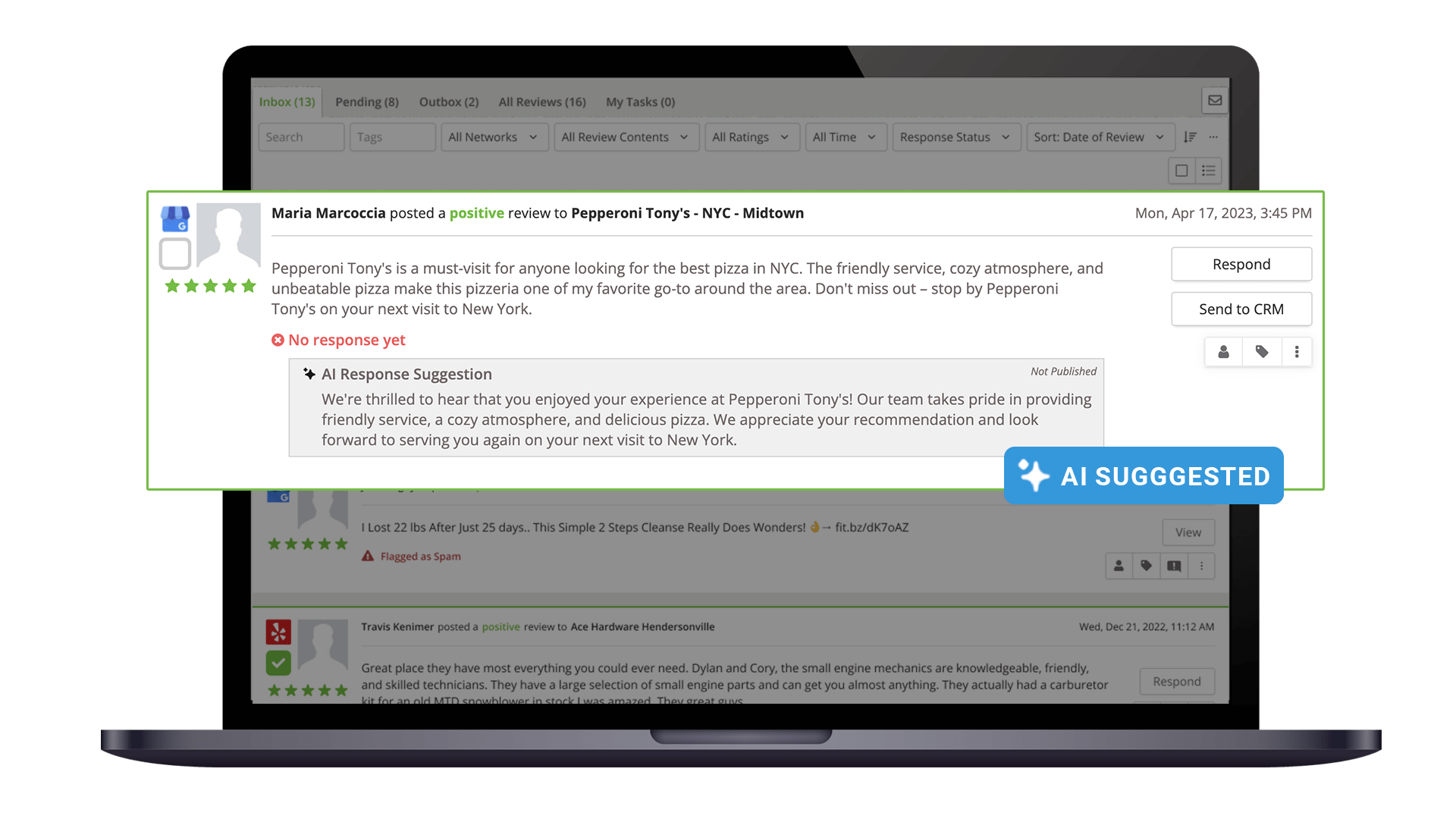What Are AI Agents? And Why Are They Critical to Local Marketing Success?
How to Quickly and Strategically Generate Reviews
How to Quickly and Strategically Generate Reviews
Customers today rely heavily on others’ opinions when considering a new product or service. Ninety-eight percent of consumers feel that reviews are an essential resource when making purchase decisions. Additionally, nearly 8 in 10 consumers specifically seek out websites with product reviews. Since customers clearly value reviews, your business must monitor the volume of reviews it receives. If you don’t have many reviews, what are you doing to ensure that changes?
If you’re not doing anything, you’re likely losing business to competitors that do. Many companies, particularly multi-location businesses, don’t generate new reviews often because they don’t have a strategy in place, and it’s too time-consuming to do so across business locations.
In this blog, we’ll explain the overarching benefits of reviews, and we’ll cover five strategic tactics to generate reviews. Let’s get started!
What is Review Generation?
First off, let’s define review generation. Review generation is the act of encouraging customers to write reviews about your business, products, and services. These reviews will appear where your business is mentioned online, such as in your local listings, and you can place them on your website to improve your conversion rate.
Benefits of Review Generation
Your company can profit in many ways from generating reviews. Below are some of the greatest benefits.
Improve Sales
Reviews, especially positive ones, can boost sales. According to one study by Northwestern University, the purchase likelihood of a product with just five reviews is 270 percent higher than products with no reviews.
Boost Online Conversions
According to our recent research report, The State of Google Reviews, when a business increases its Google Business Profile’s (GBP’s) average star rating by just one star, conversions (phone calls, website clicks, or a request for directions) increase by 44 percent.
Increase Search Rankings
Reviews also impact search rankings, especially your local listings’ local search rankings. According to a WhiteSpark Study, volume of reviews with text has the eighth largest impact on your GBPs’ local rankings. A sustained number of Google reviews, rather than bursts, positively influences your local pack rankings.
Furthermore, according to our Top Rankings and Conversion Factors for Local Search report, GBPs ranked three through five average 280 reviews, which is far less than the top-ranked GBPs that averaged 404 reviews.
Five Strategies to Generate Reviews
Now that you understand why reviews are so important, let’s look at several tactical ways to generate reviews across your local listings and social profiles. Once you’ve generated those reviews, we recommend publishing positive reviews and recommendations to your website, highlighting the benefits of your brand to potential customers.
1. Make Leaving Reviews Easy
Your customers should have an excellent user experience anytime they interact with your company, especially when leaving reviews.
Ensure the review process is as straightforward as possible by simply including a link to leave a rating and text review on your website and in communications with customers. Clients should be able to merely click and leave the review. If the process is too complex, this could keep customers from leaving a review or lower a customer’s rating.
2. Gain Reviews Through Different Channels
Most companies encourage customers to leave reviews through email. While email is a great place to start, your brand should also leverage other channels such as chatbots and SMS text messaging.
Chatbots:
If a client interacts with a chatbot, they likely have questions about their order or your brand. At the end of the conversation, give them the opportunity to leave feedback regarding their experience with your brand or around the specific product(s) or service(s) discussed.
SMS Messaging:
You can have customers opt-in to receive text messages from your brand as well. Some consumers prefer this over email. Don’t hesitate to encourage reviews via text message. Just ensure you give them a link that makes it easy to leave a review and that the site you send them to is optimized for mobile use.
Email Signature:
You can include a review link in your email signature. For instance, add a linked image or hyperlinks to your email signature with something like, “please share your experience with [your company name] with other clients.”
3. Ensure Your Business Has a Presence on Major Review Sites
Another tactic to increase review generation is to gather reviews on search and social sites your customers frequently visit. To achieve this, you need reputation management software that integrates with multiple platforms that host reviews — more on this later.
This strategy, paired with the right software, makes it easy to manage reviews from multiple sources. Additionally, having reviews on these platforms will increase your chances of other consumers visiting your businesses.
Here are a few of the most important review sites:

4. Interact With and Respond to Reviews
According to our previous research, more than three-quarters of consumers leaving critical reviews expect the business to respond to them. Furthermore, 87 percent of consumers are willing to change a negative review depending on how the business responds.
It pays dividends to respond to reviews, particularly negative ones. Not only does responding to reviews enhance customer satisfaction and customer lifetime value, but it also shows prospective consumers that you care about and address client sentiments and concerns.
Download The Multi-Location Marketer’s Guide to Online Reputation Management for specific details on how to respond to positive and negative reviews.
5. Develop a Comprehensive Online Reputation Management Strategy
Now that you know the significance of reviews and responding to them, as well as tactics to gain them, it’s time to generate and solidify an online reputation management strategy. Consider the following questions as you begin brainstorming a strategy:
- What customer sentiment trends are you seeing in your reviews?
- Which platforms are customers leaving the most reviews on?
- Which team members are responding to reviews?
- Are they adequately trained?
Layout a plan for your business that will keep all parties and team members accountable at both the corporate and local levels. It’s also essential to improvise and make improvements to your online reputation management process and strategy as time goes on.
Generating and Managing Reviews Across Multiple Business Locations
If you’re a multi-location business, you’re tasked with generating reviews across all your locations on multiple platforms. Doing this manually often seems daunting. Thus, you need a reputation management software. This is where SOCi comes in.
SOCi Reviews is a reputation management software built for multi-location businesses. SOCi Reviews integrates with all major review sites and can help you track and respond to reviews across these platforms.

Not only can you generate and monitor reviews across 100s or 1,000s of locations through SOCi Reviews, you can also use SOCi’s Reputation Insights to identify and manage emerging trends and sentiments around your local listings.
Using these trends, you can better understand what’s making top-performing locations so successful and use these insights to make proactive changes to poorly performing locations.
For a complete online reputation management strategy, we also recommend using SOCi Surveys. SOCi Surveys allows you to collect first-party responses and feedback across all locations. Similar to SOCi Reviews, SOCi Surveys comes with sentiment analysis capabilities, allowing you to better understand how the “silent majority” perceives your brand.
Also, deploying surveys often increases your positive reviews by giving consumers an outlet to list frustrations or issues they have versus writing negative reviews.

Request a demo today to learn how SOCi Reviews and SOCi Surveys can help you manage and generate reviews across all of your locations. It’s time to generate reviews to improve search rankings, grow brand awareness, and boost sales!







